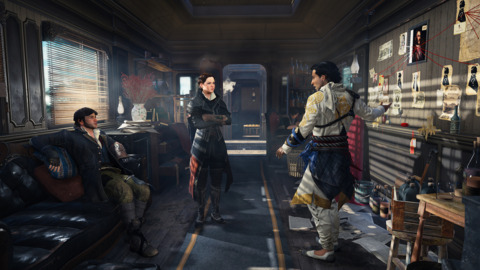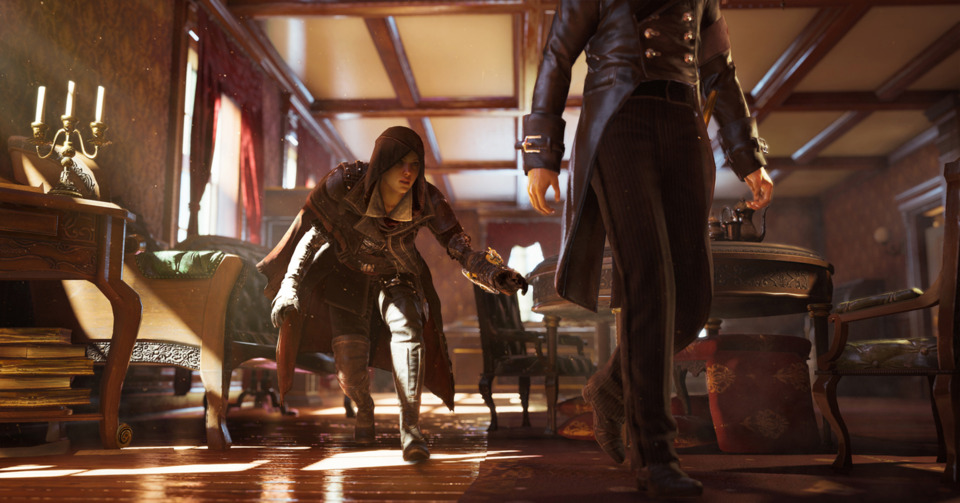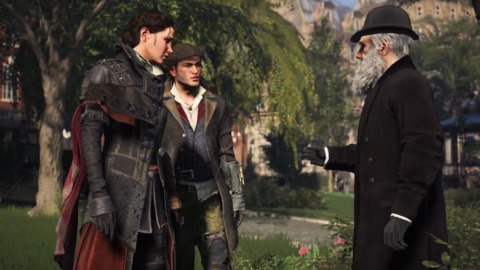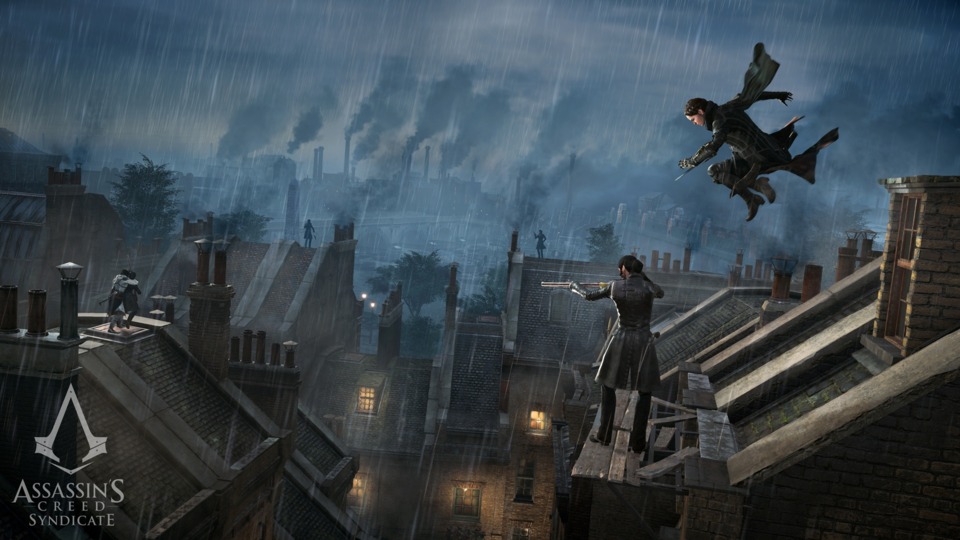Assassin's Creed Syndicate Review
The refrain you most often hear when talking about Ubisoft's Assassin's Creed series is that it's due for a break. That's not surprising when you consider that we are now nine (10, if you count Liberation) games into this series, only eight years after its debut. Quality concerns are certainly at the root of that argument--with last year's Assassin's Creed Unity offering a crash course in just about everything that can go wrong in one of these games--though the homogeneity of the open world action genre has played its part as well. If it's not Assassin's Creed directly turning players off with spotty entries, it's the overwhelming sensation that most publishers of games like these are working from the same basic playbook, riffing on the same towers, vantage points, and collectibles while swapping out assets and perspectives where appropriate.

This is what makes Assassin's Creed Syndicate such a peculiar thing. On paper, Syndicate doesn't appear to offer up much beyond what every other Assassin's Creed game does. It's the same stab-happy open world design plopped into another noteworthy point in history--in this case, Victorian era London--with only a new pair of switchable protagonists and horse drawn carriages to set itself apart.
But here's the thing: Syndicate is good. Very good. Yes, it's running an overly familiar playbook, but those plays are among the very best this series has ever offered. In Syndicate, Assassin's Creed is reconstructed into something resembling its former glory--not a particularly new or inventive game, but a sturdily built, enjoyably written, generally well-paced refabrication of what this franchise was once best at delivering. And where it does tinker with the formula, it makes small, but meaningful improvements that turn Victorian London into one of the most exciting and exquisite worlds this series has ever put together.
That is maybe an odd description for the often gloomy, coal-stained architecture of London, circa 1868, but Ubisoft Quebec (and the roughly seven other teams who all had a part in creating Syndicate) did a tremendous job turning the city into a viable playground. A playground, of course, infested with templars, who have turned the city into a haven of corruption, gang warfare, and abuses of the working class. As such, it is up to twin protagonists Jacob and Evie Frye to rescue the city, even though the assassins guild would seemingly rather they didn't. When we first meet the pair, they're working small time assassinations in the English countryside, eager to take their talents into the capital. The templars have tapped into every vein of commerce running through the city, and despite the pleas of London's resident assassin--the helpful, but inexperienced Henry Green--the council refuses to assist his efforts to beat back the templars' influence. After offing a pair of templar middle men, Jacob and Evie take it upon themselves to hop a train to London to help clear the city.
Their adversary is Crawford Starrick, a curl-mustached overlord hellbent on uncovering another first civilization artifact, which Evie very much wants to intercept. Jacob, on the other hand, would much rather focus on establishing his own gang to rival the templars' Blighters, who dominate every neighborhood in the city.
This creates something of a split narrative. Evie's hunt for the artifact and Jacob's templar murders are separated in the game's core story missions, though for any other events on the map, you can choose to play either one. There's little meaningful benefit to choosing one or another; Jacob is a touch better at combat, while Evie's marginally better in stealth situations, but outside of a few specific skill upgrades for each, the differences are negligible. Each of their motivations are similarly surface-level. Neither character gets much backstory; they're almost exclusively defined by their approach to ridding the city of the templars, and occasionally their squabbles with each other. Evie is the more level-headed of the two, and she often finds herself cleaning up after her chucklehead brother, who often kills without thinking of the larger consequences. Then again, that's been true of any number of other, better-defined Assassin's Creed heroes over the years. Despite appearances to the contrary, this series is practically founded on the notion of killing first, and sorting out the messes later.

More interesting than the Frye twins are Syndicate's villains. Yes, they're all violent cartoons of industrial capitalist excess, including an orphan abusing factory owner, a phrenologically obsessed doctor, and a gang leader that operates like a 19th century precursor to the Joker. They're all varying degrees of ridiculous--with Starrick in particular presenting as so over-the-top evil that he literally shoots an underling for disturbing him as he sings a sad piano ballad--but that ridiculousness is wholly welcome.
Despite featuring all manner of terrible things happening to the people of London, Syndicte never wallows in its own misery, never assigns too much self-seriousness to its story. I'm not saying that Assassin's Creed can't ever take itself seriously, but I'd argue it's often best when it doesn't. These games have always hovered somewhere around The Da Vinci Code in terms of how much grave importance they assign to their very silly conspiracies and historical revisionism. Syndicate drifts closer to the tone of something like National Treasure, and I don't mean that as an insult. This is, after all, a game in which you are hunting for a magical healing cloak left behind by an ancient Earth civilization; in which you command an army of orphan scamps who offer up cash and crafting materials on command; in which you and Florence Nightengale GTA a horse-drawn carriage so you can rescue a kidnapped Charles Darwin. At a certain point you either have to embrace the ridiculousness of such premises, or try to wallpaper it over with hefty helpings of grimness. Syndicate, thankfully, embraces its inherent silliness, while still making it feel like its story matters in the larger context of the series. It's a trifle, but an endearing one.
Syndicate also has some of the best-designed assassination missions anywhere in the series. These are the meat of Syndicate's campaign. Each target is a rung on the ladder to Starrick, and before you can tackle them, you'll have to perform a couple of set-up missions with each character. These set-up missions are rarely highlights--you mostly find yourself running errands and tracking targets--but they provide necessary context for why you're about to go kill whoever you're about to go kill. When it does finally come time to eliminate your target, you now have an added variety of ways to go about it. Each assassination comes with stealth, assistance, and unique kill opportunities. These are highlighted icons that appear within the environment, usually over some random NPC or hiding spot that you can engage with to more dramatically achieve your goal. These tasks aren't terribly hard to achieve in most cases, but they do require a bit more effort than the old ceiling drop of doom. It's essentially a light dusting of Hitman onto the existing assassination framework, but it's enough to make these tasks feel fresh.
As good as the assassinations are, they're but a fraction of what you'll spend your time doing in Syndicate. London is littered with objectives, hidden chests, sync points and side ventures for historical figures. It's a loaded map, but it doesn't feel quite as daunting as it did in Unity. Outside of the historical missions, which tend to run a bit longer, most of the non-story ventures are shorter, more focused tasks, which tie into the game's gang elements. Every neighborhood is broken up into districts, which each have a templar gang stronghold, factory, or sub-boss occupying it. Taking over a stronghold, clearing a factory (and rescuing the orphans trapped within), and either kidnapping or killing a templar target clears that territory of Blighter influence. This means fewer templar bad guys walking around, and more of your own crew in their place, which is handy as you can recruit your own gang members to fight for you, or just cause a distraction while you enter an area discreetly.
The gang stuff is, admittedly, weird. Once you've cleared a territory of all the relevant objectives, you unlock a gang brawl. Winning this brawl (which isn't especially difficult) earns you a goofy cutscene where Jacob or Evie announce to a group of rival gang members that they work for them now, which the gangsters seem instantly cool with. It's kind of an anticlimactic way to conclude the side objectives you've been pushing through prior to that point, but those objectives are generally fun enough that it's not a huge deal. Each templar hunt is essentially a mini-assassination mission with its own suggested way of taking down the target, and the bounty hunts present a solid little challenge as you try to figure out how to take your target alive while navigating around groups of enemies.

The kidnapping mechanic is one of the few new gameplay wrinkles Syndicate offers, and it is occasionally a frustrating addition. Kidnapping requires you to sneak up on a target, then punch/grab them into an armbar, which lets you guide them wherever you want. Early on they'll struggle or try to escape, but once you unlock a related perk in Jacob and Evie's skill trees, they'll cut that out entirely. That doesn't remove the challenge from the bounty hunt missions, however. You still have to guide them around the environment without enemies noticing you, and when you screw up, the AI will often try to bolt away from you.
Often, but not always. Sometimes the AI just stands there while you fight off random thugs, seemingly too petrified to try to escape. Either that, or the AI just gets borked up. That will happen occasionally in Syndicate. Though it suffers from nowhere near the litany of technical issues that Unity did, Syndicate can be a little rough in places. Usually, it's the kind of open world jank you see in just about any game like this. Characters getting hung up on things, clipping awkwardly, or physics going nuts and launching enemies to ludicrous heights. A couple of side missions bugged out on me too, mostly in the Karl Marx quest line. In both cases, the bugs resulted in me succeeding despite not meeting the objectives as described, which was a bummer, but I suppose not as bad as failing me despite having met all the required objectives. That only happened once.
Other changes to Syndicate mostly factor into how you traverse the city of London. The best of the two is the new grappling hook, a device that lets you quickly scale buildings, and build zip lines between them. London is a much wider city than most Assassin's Creed locations. The distance between blocks is often much more than either character can easily jump, so the zipline is a huge help when you want to jump from place to place quickly. It's still fun to climb buildings the old fashioned way, of course. Syndicate's traversal mechanics are the strongest in the series, only occasionally guessing wrong or getting you hung up on a piece of scenery as you hop around.
Decidedly less great are the horse drawn carriages. Look, this was the mode of transportation of the era, so it would have been silly for the developers not to include them. That said, they're a mess. They're no bother when they're just trotting around the city, but the second you get behind the wheel--er, harness--they're a huge pain. They are, perhaps unsurprisingly, unwieldy to control, and extremely difficult to maneuver with any precision. That's probably true to life, but it doesn't make the missions where you're required to drive them any more enjoyable. Thankfully, most of these are optional hijacking and race missions you never have to touch, but there are a number of story and larger side missions that have you driving these awful horse boxes around, often engaging in awkward gunplay and carriage hopping in the process.
Carriages aside, I had a blast with Syndicate's rendition of London. It's every bit as detailed and lively as Unity's vision of Paris, but more technically sound and with more space to move around in. The city isn't nearly as separated from Jacob and Evie as Paris was from Arno. People are more reactive to the pair, freaking out and bolting when you kill an enemy in plain view--well, most of the time, anyway. Some of the more scripted sequences sometimes struggle with this. If guards spot you, you can often kill them off without mission-specific bystanders reacting at all. This does create a few uncanny moments throughout the experience, but those aren't the norm. More often, London feels alive, or at least more alive than any other city depicted in this series.

The easy conclusion to this review is the age old "fans of the series will love it" chestnut. But Syndicate isn't such an easy thing to brush off that way. Yes, fans of Assassin's Creed will definitely get what they want out of this sequel, especially if you're the sort that's invested in the larger metaplot, which this game advances ever so slightly for the first time in years. But that familiar refrain, about over familiarity and franchise fatigue, still echoes in the background. This is, after all, not the first time Assassin's Creed has rebounded from a lousy entry. There are only so many times you can be reminded of why you liked a series before you also start realizing why you had to be reminded in the first place.
Still, Syndicate represents the most fun I've had with an Assassin's Creed game since Black Flag. It's proof that there's still life in this franchise, even when it goes badly astray. Now, what say we give it a short rest, so that maybe it won't have to be defibrillated back from the brink yet again?
